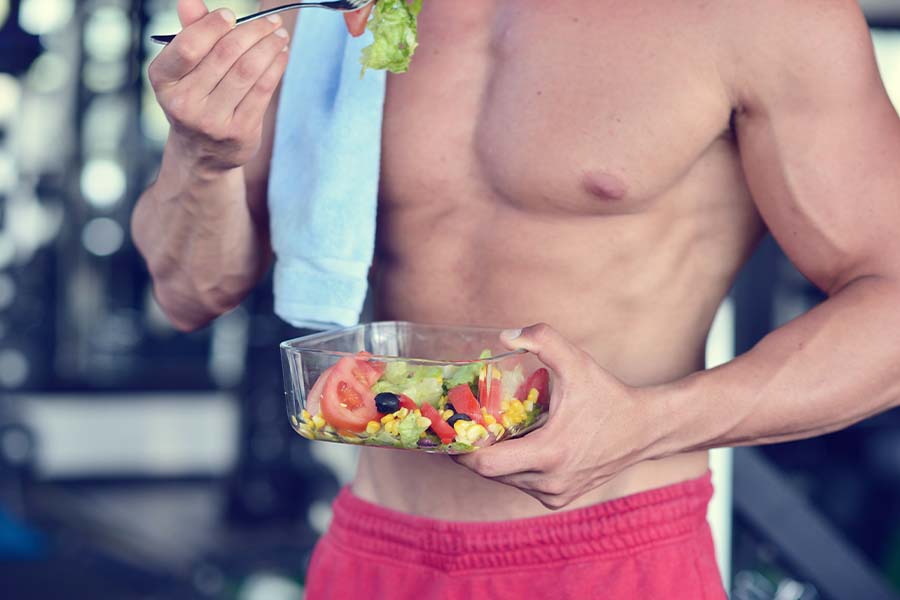Whether you are a bodybuilder, an athlete, or just trying to get into shape, the vegan bodybuilding diet is an excellent way to fuel your body for optimal performance and health. It provides you with the necessary nutrients to build muscle, stay healthy and eliminates many harmful animal products from your diet that can be detrimental to long-term wellness.
This article helps create a balanced vegan diet for bodybuilding and understand why this type of lifestyle benefits athletes of all types.
Related Article: 7-Day Bodybuilding Diet Plan to Build Muscle and Lose Fat
What Is a Vegan Bodybuilding Diet?
A vegan bodybuilding diet is based on plant-based foods, usually fruits, vegetables, grains, legumes, and nuts. This type of diet focuses on consuming high protein and healthy fats while eliminating animal products from the diet. It's important to note that this isn't a "quick fix" or "fad diet," as it takes consistency and dedication to achieve substantial results.
People mainly choose to follow a vegan bodybuilding diet for health reasons as animal products have been allegedly linked to many illnesses, including heart disease, certain types of cancer, obesity, and diabetes. Eating plenty of fruits and vegetables has been proven to reduce the risk of developing these and other diseases.
By eliminating animal products from your diet, you may also reduce your environmental impact, as many factory farming practices can harm the planet.
Can a Vegan Diet Help in Building Muscles?
The short answer is yes! A vegan diet helps in building muscles. Studies have shown that plant-based proteins are effective in building muscle and strength.
Many professional bodybuilders and athletes choose a vegan lifestyle due to the numerous benefits, such as improved energy levels, better digestion, and increased vitality.
How to Start a Vegan Bodybuilding Diet
A vegan diet can help build muscle, increase strength, and improve overall health. But it's essential to understand how to optimize your nutrition for maximum results. Let's show you how to start a successful vegan bodybuilding diet.
Protein
Plant-based proteins should be the primary source of protein in a vegan bodybuilding diet. Examples of these are beans, legumes, tofu, tempeh, and seitan. You can also find plant-based whey protein powders to supplement your meals.
Related Article: 5 Things You Should Keep in Mind When Taking Whey Protein
Fiber
Eating plenty of fiber-rich grains, vegetables, and fruits will help ensure proper digestion and provide essential vitamins and minerals. Fruits and vegetables provide the body with essential vitamins, minerals, antioxidants, and fiber to stay healthy. Plenty of leafy greens, colorful fruits, and root vegetables will give you enough micronutrients.
Healthy Fats
Healthy fats like avocados, olives, seeds, and nuts are essential for overall health and should be included in most daily meals. Not only do they provide energy and vitamins, but they also help regulate hormones and support cell growth.
Nuts and seeds are excellent sources of healthy fats and can provide protein. Avocados and plant-based oils like olive or coconut are other great sources.
Vitamins & Minerals
Dark leafy greens, cruciferous vegetables, and citrus fruits are all excellent sources of essential vitamins and minerals. In addition, consider taking a vegan multivitamin supplement to ensure you get all the nutrients your body needs for optimal health.
Include Complex Carbs
Complex carbohydrates such as quinoa, oats, sweet potatoes, and brown rice are all excellent energy sources for bodybuilding. Consuming complex carbs will give you sustained energy throughout the day and help fuel your workouts.
Stay Hydrated
Staying hydrated is vital for muscle recovery after a workout and overall health. Drink around 8 glasses of water daily or more if you're exercising intensely or in hot weather.
Tips for Vegan Bodybuilders
If you're looking to achieve your physical fitness goals, then you know the dedication and determination required. To maximize success in achieving these objectives, it's critical that both nutrition and training are on point! To help you out, we've put together some tips for vegan bodybuilders. Let's get started!
Set Realistic Goals
It's important to set realistic goals when starting out. Don't push yourself too hard- focus on sustainable and achievable goals. This will help you develop a positive attitude towards vegan bodybuilding, rather than feeling overwhelmed and discouraged by how much work is required before you achieve your desired results.
Make sure that you are sticking with your workouts, eating properly and not overindulging in snacks or unhealthy meals. If needed, set reminders on your phone or calendar so that you don't forget to stay on track!
Get Enough Rest
Getting enough rest is just as important as working out in bodybuilding. Make sure you are getting 7-9 hours of sleep every night and taking occasional naps in between workouts if needed. Also, make sure not to skimp on eating before bedtime-- this will help your body recover during the night so that you can be ready for your next workout!
Supplement Wisely
Supplementing with vegan-friendly vitamins and minerals can help provide your body with essential nutrients that might be missing from your diet. Specific vitamins and minerals, such as B12, iron, and zinc, may be challenging for a vegan diet. Consider taking natural supplements to fill any nutritional gaps in your diet if needed. Talk to a qualified nutritionist or naturopath to ensure you are getting all the right supplements for optimal health and performance.
Track Your Progress
Tracking your progress is essential when it comes to bodybuilding. Keep a food and exercise journal to stay on track and monitor your progress. Be sure to track what you are eating in order to ensure that your goals are being met! Overall, vegan bodybuilding can be an incredibly rewarding experience. With dedication and focus, it is possible to reach any goal.
Following a vegan bodybuilding diet can be challenging, but you can reach your fitness goals with the correct information, dedication, and consistency. Don't forget to take care of yourself, get enough rest and enjoy the process!
Vegan Bodybuilding Grocery List
You need a grocery list to help you reach your goals of building muscles. As you know, not all foods are created equal regarding nutrition and building muscle. That's why we've compiled this comprehensive vegan bodybuilding grocery list, so you know exactly what to buy when you hit the store.
- Legumes (chickpeas, lentils, black beans, etc.)
- Nuts & Seeds (almonds, walnuts, chia seeds, etc.)
- Whole Grains (quinoa, brown rice, oats, etc.)
- Leafy Greens (spinach, kale, cabbage, etc.)
- Healthy Fats (avocado, olives, coconut oil, etc.)
- Fruits & Vegetables (bananas, apples, tomatoes, etc.)
- Plant-Based Protein Powders
- Nutritional Yeast
With this grocery list, you can be confident that your vegan bodybuilding diet is well-balanced and nutritious. Start stocking up on these items, and get ready to start your journey toward a healthier, stronger you!
Sample Vegan Bodybuilding Meal Plan
Knowing what foods and meals will help you reach your goals as a vegan bodybuilder can sometimes be challenging.
That's why we've compiled this sample vegan bodybuilding meal plan full of tasty and nutritious recipes to help you see results faster. With this meal plan, you'll get all the protein and vitamins you need without compromising your ethics or beliefs. Read on for more information about these delicious dishes!
Breakfast:
1. Green smoothie bowl spinach, banana, frozen berries, and almond milk - Calorie count: 300, Protein count: 10 g, Carbohydrates: 53 g, Fat: 8 g
2. Chia pudding with nuts and seeds - Calorie count: 400, Protein count: 20 g, Carbohydrates: 70 g, Fat: 15 g
3. Peanut butter oatmeal topped with fruit - Calorie count: 340, Protein count: 13 g, Carbohydrates: 45 g, Fat: 12 g
Lunch:
1. Lentil & vegetable soup with quinoa and a side salad - Calorie count: 400, Protein count: 20 g, Carbohydrates: 65 g, Fat: 6 g
2. Quinoa-stuffed bell peppers served with roasted vegetables - Calorie count: 430, Protein count: 25 g, Carbohydrates: 65 g, Fat: 10 g
3. Chickpea & spinach wrap filled with avocado, cucumber, tomato, and hummus - Calorie count: 480, Protein count: 20 g, Carbohydrates: 70 g, Fat: 20 g
Snacks:
1. Veggie sticks dipped in tahini dressing or hummus - Calorie count: 170, Protein count: 4 g, Carbohydrates: 20 g, Fat: 9 g
2. Trail mix made from nuts, seeds, and dried fruits - Calorie count: 300, Protein count: 10 g, Carbohydrates: 30 g, Fat: 15 g
3. Protein shake made from plant-based protein powder - Calorie count: 300, Protein count: 20 g, Carbohydrates: 20 g, Fat: 10 g
Dinner:
1. Lentil & vegetable stir-fry served with brown rice - Calorie count: 400, Protein count: 20 g, Carbohydrates: 65 g, Fat: 6 g
2. Cashew cream pasta with mushrooms and spinach - Calorie count: 440, Protein count: 25 g, Carbohydrates: 60 g, Fat: 15 g
3. Baked tofu with roasted vegetables and quinoa - Calorie count: 380, Protein count: 25 g, Carbohydrates: 35 g, Fat: 15 g.
These vegan bodybuilding meals provide a balanced mix of proteins, carbohydrates, healthy fats, and fiber to maintain high energy levels.
The Benefits of a Vegan Bodybuilding Diet
Are you looking to increase your strength, build muscle mass and burn fat? Well, a vegan bodybuilding diet may be the answer for you! It provides high-quality plant-based nutrition to support healthy muscle growth. It offers many other advantages, such as improved energy levels, digestion, and reduced risk of serious illnesses.
A vegan bodybuilding diet has many benefits. These include:
Lower Cholesterol Levels
By cutting out animal-based foods, vegans reduce their total cholesterol levels and also lower their LDL (bad) cholesterol levels. Plant-based diets also boost your HDL (good) cholesterol levels, helping you maintain a healthy balance for optimal cardiovascular health.
Studies have shown that vegans tend to have lower cholesterol levels than their non-vegan counterparts, which can reduce the risk of heart disease and other health issues.
Improved Digestion
A plant-based diet can help improve digestion by reducing the number of heavy animal fats consumed. This helps keep your digestive system functioning optimally so you can absorb more necessary vitamins and minerals from food sources.
More Energy
Eating a vegan diet can also provide sustained energy levels, as it eliminates processed and refined carbohydrates from your diet. This helps keep blood sugar levels steady throughout the day, avoiding the crash many people experience after consuming sugary or carb-heavy snacks.
Better Overall Health
Lastly, a vegan bodybuilding diet gives you more vitamins and minerals than most other diets offer. Plants are concentrated sources of antioxidants, fiber, and essential nutrients that can improve overall well-being and immunity.
A vegan bodybuilding diet has numerous advantages for those looking to stay in peak physical shape while eliminating animal products.
The Bottom Line
The vegan bodybuilding diet is an excellent way to fuel your body for performance while improving overall health and well-being. You can build strong muscles while avoiding animal products with the right balance of plant-based proteins, healthy fats, fiber, vitamins, and minerals.
Experience the advantages of a vegan bodybuilding diet by introducing new foods such as spinach, quinoa, legumes and nuts to your meals. Tofu, vegetables, fruits and seeds are also great sources of nutrition that can help you reach your goals faster!
So if you want to switch to veganism and still want to reach your fitness goals, try this diet plan and start building muscle today.
Reading List
Junk Food Makes You Miserable - It's Time to Ditch Junk Food.
10 Muscle-Building Meals That You Can Eat Before Bed
Foods Containing the Nine Essential Amino Acids That Must Be in Your Diet
The Exact Foods Vegans Should Have daily for Getting All Nine Essential Amino
Article Sources
- Hevia-Larrain, Victoria, et al. "High-Protein Plant-Based Diet Versus a Protein-Matched Omnivorous Diet to Support Resistance Training Adaptations: A Comparison Between Habitual Vegans and Omnivores." Sports Medicine, vol. 51, no. 6, June 2021, pp. 1317-30. Springer Link, https://doi.org/10.1007/s40279-021-01434-9.











